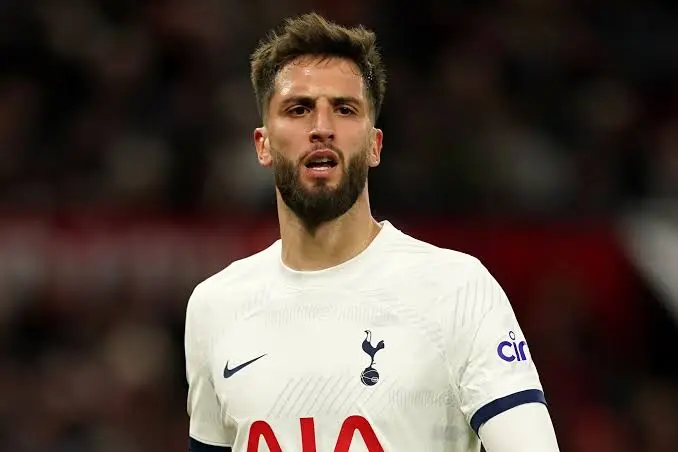Tottenham Hotspur are reportedly shocked and frustrated by the FA’s decision to impose a seven-match ban on Rodrigo Bentancur following a racist remark he made during a YouTube interview.
The midfielder, who has become an integral part of Spurs’ midfield since joining the club, was fined £100,000 and banned after comments he made in an interview conducted in his native Uruguay. The controversial remarks, in which Bentancur suggested that Tottenham teammate Son Heung-min resembled other South Koreans to the point of being indistinguishable, have sparked widespread condemnation.
The FA’s decision has raised eyebrows not only within the walls of Tottenham Hotspur but also among their Premier League rivals, who have been left “shocked” by the severity of the punishment. The ban, which has effectively ruled Bentancur out of action for a significant stretch of matches, has brought to the forefront questions about the consistency and fairness of disciplinary actions for similar incidents. Spurs are reportedly considering their next steps, including the possibility of appealing the ban, as they seek clarity and consistency in the FA’s approach to handling such matters.
Bentancur’s punishment has drawn comparisons with other high-profile incidents involving alleged racial or discriminatory comments, where the outcomes have been far less severe. One such case involves Chelsea midfielder Enzo Fernandez, who was accused of making racist and homophobic remarks about the French national team during Argentina’s international duty earlier this year. Despite the gravity of the situation, Fernandez was not banned by the FA. Instead, it was reported that Chelsea would impose a fine, with the FA suggesting that the incident fell under FIFA’s jurisdiction, as it occurred while Fernandez was with his national team at the Copa America.
The contrasting outcomes between Bentancur’s case and Fernandez’s situation have led to further confusion and frustration among Tottenham officials. According to reports, the FA’s decision to pursue action against Bentancur stems from the fact that his comments were made during an interview while he was an active Premier League player, thus falling under their jurisdiction. However, many feel that this creates a double standard, as Fernandez’s incident, which also involved high-profile comments made while representing his national team, was dealt with differently.
Advertisement
Latest Press Conference
We’re on Social Media



Further complicating the situation are the punishments handed to other players involved in controversial incidents. In a separate case, both Rodri of Manchester City and Alvaro Morata of Atletico Madrid received one-match bans from UEFA after chanting “Gibraltar is Spanish” during celebrations following Spain’s Euro 2024 final victory over England. The relatively light punishments given to these players have only fueled the sense of frustration among Tottenham and their supporters, who are questioning why Bentancur’s ban is so much lengthier and more punitive in comparison.
The differences in how these incidents have been handled have raised concerns about the consistency and transparency of disciplinary procedures within football’s governing bodies. Critics argue that the lack of uniformity in punishment suggests a level of arbitrariness in how such matters are addressed, leaving players, clubs, and fans alike struggling to understand the criteria that determine the severity of sanctions. This perceived inconsistency has added to the sense of bewilderment at Tottenham Hotspur, where many feel that Bentancur has been disproportionately penalized.
For Tottenham, the timing of the incident could not have been worse. With the club facing a challenging period in the Premier League, Bentancur’s absence from the squad will be keenly felt. The 22-year-old Uruguayan has established himself as one of Spurs’ most influential players in recent seasons, contributing both defensively and offensively in midfield. His seven-match ban is a significant blow to Tottenham’s hopes of maintaining momentum in the league, particularly as they aim to secure a top-four finish and qualify for European competition.
The club’s response to the ban has been notably cautious, with no official statement issued regarding their stance on the punishment. However, sources suggest that Tottenham are deeply disappointed by the decision, not only because of the impact on Bentancur’s availability but also due to the perceived unfairness of the ruling. With the right to appeal the ban, Spurs are reportedly weighing their options and may look to challenge the severity of the punishment in the coming days.
In the broader context of football’s efforts to combat racism and discrimination, Bentancur’s ban adds another layer of complexity to the ongoing debate about how such incidents should be addressed. While there is no question that racism and discriminatory comments should be met with strong condemnation, the consistency of the punishments meted out remains a contentious issue. As the governing bodies of football continue to grapple with how best to deal with such incidents, the contrasting cases of Bentancur, Fernandez, Rodri, and Morata highlight the need for clearer guidelines and more transparent decision-making.
For Tottenham, the key issue now is whether they can navigate the fallout from Bentancur’s ban and find a way to cope without one of their key midfielders for an extended period. While the club is likely to pursue an appeal, the situation has nonetheless cast a shadow over an already difficult season. In the meantime, Tottenham’s Premier League rivals will undoubtedly continue to watch closely as the case develops, with many wondering whether this will mark a turning point in how football’s disciplinary bodies handle similar cases in the future.
As for Bentancur, the young midfielder will now have to focus on the road ahead, hoping that his actions and subsequent remorse will be taken into account if the club chooses to challenge the ban. In the meantime, Tottenham will look to regroup and prepare for the challenges that lie ahead in what is shaping up to be a turbulent season for the North London club. How they navigate this issue, both on and off the pitch, will likely have far-reaching implications for the rest of the campaign.
